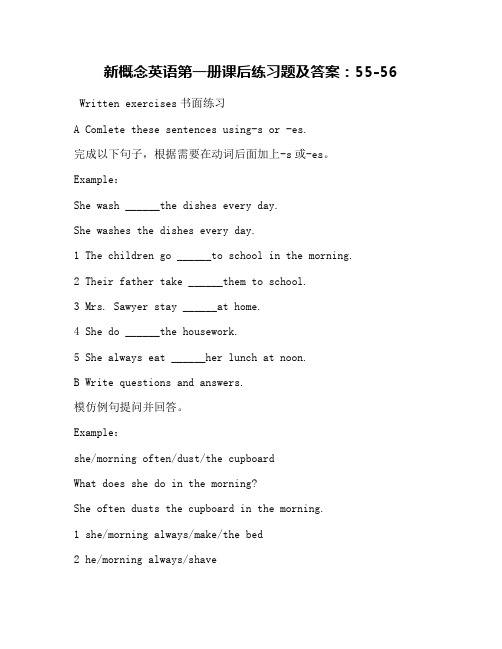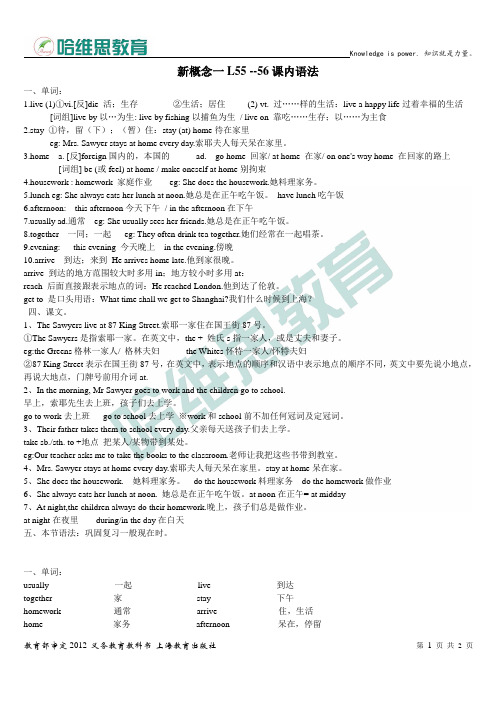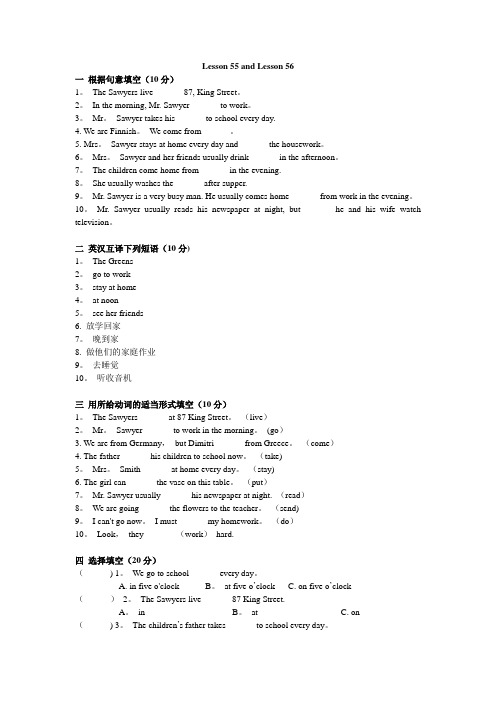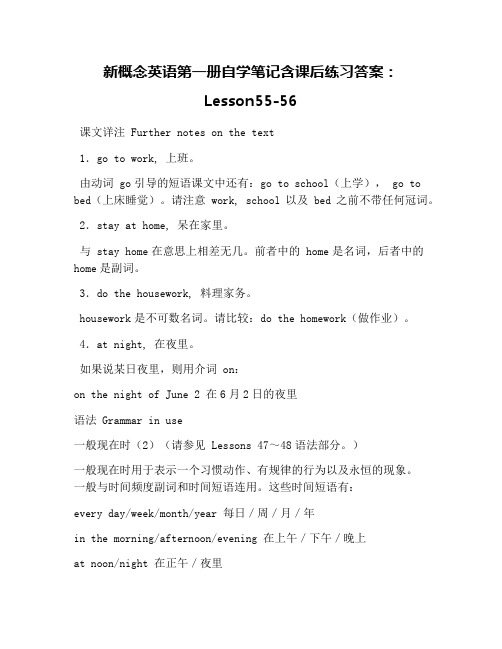新概念英语Lesson55-56每课一练(含答案)
新概念英语第一册课后习题及答案:Lesson55-56

新概念英语第一册课后习题及答案:Lesson55-56 Written exercises书面练习A Comlete these sentences using-s or -es.完成以下句子,根据需要在动词后面加上-s或-es。
Example:She wash ______the dishes every day.She washes the dishes every day.1 The children go ______to school in the morning.2 Their father take ______them to school.3 Mrs. Sawyer stay ______at home.4 She do ______the housework.5 She always eat ______her lunch at noon.B Write questions and answers.模仿例句提问并回答。
Example:she/morning often/dust/the cupboardWhat does she do in the morning?She often dusts the cupboard in the morning.1 she/morning always/make/the bed2 he/morning always/shave3 they/evening sometimes/listen to/the stereo4 he/every day always/clean/the blackboard5 they/night always/go/to bed early6 she/every day usually/wash/the/dishes7 they/afternoon usually/type/some letters8 it/every day usually/drink/some milk9 they/evening sometimes/watch/television10 she/noon always/eat/her lunch11 he/evening often/read/his newspaper答案:Lesson 56A1 The children go to school in the morning.2 Their father takes them to school.3 Mrs. Sawyer stays at home.4 She does the housework.5 She always eats her lunch at noon.B1 What does she do in the morning? She always makes the bed in the morning.2 What does he do in the morning? He always shaves in the morning.3 What do they do in the evening? They sometimes listen to the stereo in the evening.4 What does he do every day? He always cleans the blackboard every day.5 What do they do at night? They always go to bed early at night.6 What does she do every day? She usually washes the dishes every day.7 What do they do in the afternoon? They usually type some letters in the afternoon.8 What does it do every day? It usually drinks some milk every day.9 What do they do in the evening? They sometimes watch television in the evening.10 What does she do at noon? She always eats her lunch at noon.11 What does he do in the evening? He often reads his newspaper in the evening.。
新概念一55-56练习详解

Lesson55二选择( B )1. He ______to do his lessons at eight every evening.A. is beginningB. beginsC. begin详解:他总是在每天晚上八点钟开始做他的功课。
Begin to do sth 开始做某事。
第三人称单数,谓语动词用第三人称单数。
( C )2. He usually _______TV on Sunday evening.A. watchB. watchingC. watches详解:他总是星期天的晚上看电视Usually提示使用一般现在时,主语提示谓语动词使用三单。
( B )3. ----Do you know Susan’s address?----Yes. She lives ____201 , Dongchang Road ,Liaocheng City.A. inB. atC. on详解:你知道苏珊的地址码?是的,她居住在liaocheng市东昌路201号。
小地点使用介词AT.(A )4. My brother _____ a lot. He is reading a new magazine now.A . reads B. read C. has read详解:我的兄弟经常阅读,他现在正在阅读一份新的杂志。
经常性习惯性的行为使用一般现在时。
主语三单提示谓语动词也使用三单。
( B )5. They usually have a football match ___Friday.A. inB. onC. to详解:他们通常在星期五看足球赛。
星期前用介词ON( B )6. He went there ______, not ______.A. on the car/by carB. on foot/ by carC. in his car/by his foot 详解:他总是走路去哪儿,而不是坐车。
新概念英语第一册课后练习题及答案:55-56

新概念英语第一册课后练习题及答案:55-56 Written exercises书面练习A Comlete these sentences using-s or -es.完成以下句子,根据需要在动词后面加上-s或-es。
Example:She wash ______the dishes every day.She washes the dishes every day.1 The children go ______to school in the morning.2 Their father take ______them to school.3 Mrs. Sawyer stay ______at home.4 She do ______the housework.5 She always eat ______her lunch at noon.B Write questions and answers.模仿例句提问并回答。
Example:she/morning often/dust/the cupboardWhat does she do in the morning?She often dusts the cupboard in the morning.1 she/morning always/make/the bed2 he/morning always/shave3 they/evening sometimes/listen to/the stereo4 he/every day always/clean/the blackboard5 they/night always/go/to bed early6 she/every day usually/wash/the/dishes7 they/afternoon usually/type/some letters8 it/every day usually/drink/some milk9 they/evening sometimes/watch/television10 she/noon always/eat/her lunch11 he/evening often/read/his newspaper答案:Lesson 561 The children go to school in the morning.2 Their father takes them to school.3 Mrs. Sawyer stays at home.4 She does the housework.5 She always eats her lunch at noon.B1 What does she do in the morning? She always makes the bed in the morning.2 What does he do in the morning? He always shaves in the morning.3 What do they do in the evening? They sometimes listen to the stereo in the evening.4 What does he do every day? He always cleans the blackboard every day.5 What do they do at night? They always go to bed early at night.6 What does she do every day? She usually washes the dishes every day.7 What do they do in the afternoon? They usually type some letters in the afternoon.8 What does it do every day? It usually drinks some milk every day.9 What do they do in the evening? They sometimes watch television in the evening.10 What does she do at noon? She always eats her lunch at noon.11 What does he do in the evening? He often reads his newspaper in the evening.。
新概念英语第一册55-56课课文详解、翻译及语法

Lesson 55The Sawyer family索耶一家人Listen to the tape then answer this question. When do the children do their homework?听录音,然后回答问题。
孩子们什么时候做功课?The Sawyer live at 87 King Street.In the morning, Mr. Sawyer goes to work and the children go to school.Mrs. Sawyer stays at home every day. She does the housework.She always eats her lunch at noon.In the afternoon, she usually sees her friends. They often drink tea together.In the evening, the children come home from school. They arrive home early.Mr. Sawyer comes home from work. He arrives home late.At night, the children always do their homework. Then they go to bed. Mr. Sawyer usually reads his newspaper, but sometimes he and his wife watch television.New Word and expressions 生词和短语livev. 住,生活stayv. 呆在,停留homen. 家;adv. 到家houseworkn. 家务lunchn. 午饭afternoonn. 下午usuallyadv. 通常togetheradv. 一起eveningn. 晚上arrivev. 到达nightn. 夜间参考译文索耶一家住在国王街87号。
2016新概念第一册 Lesson 55-56 课堂及课后练习

新概念一L55 --56课内语法一、单词:1.live (1)①vi.[反]die 活;生存②生活;居住(2) vt. 过……样的生活:live a happy life过着幸福的生活[词组]live by以…为生: live by fishing以捕鱼为生/ live on 靠吃……生存;以……为主食2.stay ①待,留(下);(暂)住:stay (at) home待在家里eg: Mrs. Sawyer stays at home every day.索耶夫人每天呆在家里。
3.home a. [反]foreign国内的,本国的ad. go home 回家/ at home 在家/ on one's way home 在回家的路上[词组] be (或feel) at home / make oneself at home别拘束4.housework : homework 家庭作业eg: She does the housework.她料理家务。
5.lunch eg: She always eats her lunch at noon.她总是在正午吃午饭。
have lunch吃午饭6.afternoon: this afternoon今天下午/ in the afternoon在下午ually ad.通常eg: She usually sees her friends.她总是在正午吃午饭。
8.together 一同;一起eg: They often drink tea together.她们经常在一起唱茶。
9.evening: this evening 今天晚上in the evening.傍晚10.arrive 到达;来到He arrives home late.他到家很晚。
arrive 到达的地方范围较大时多用in;地方较小时多用at:reach 后面直接跟表示地点的词:He reached London.他到达了伦敦。
新概念一册lesson55-56练习题

Lesson 55 and Lesson 56一根据句意填空(10分)1。
The Sawyers live ______ 87, King Street。
2。
In the morning, Mr. Sawyer ______ to work。
3。
Mr。
Sawyer takes his ______ to school every day.4. We are Finnish。
We come from ______。
5. Mrs。
Sawyer stays at home every day and ______ the housework。
6。
Mrs。
Sawyer and her friends usually drink ______ in the afternoon。
7。
The children come home from ______ in the evening.8。
She usually washes the ______ after supper.9。
Mr. Sawyer is a very busy man. He usually comes home ______ from work in the evening。
10。
Mr. Sawyer usually reads his newspaper at night, but ______ he and his wife watch television。
二英汉互译下列短语(10分)1。
The Greens ______2。
go to work ______3。
stay at home ______4。
at noon ______5。
see her friends ______6. 放学回家______7。
晚到家______8. 做他们的家庭作业______9。
去睡觉______10。
听收音机______三用所给动词的适当形式填空(10分)1。
新概念成人版第一册练习题L55~56

Lesson 55~56一、单词辨音。
( ) 1. A. homework B. housework C. work D. together( ) 2. A. together B. weather C. north D. father( ) 3. A. lunch B. usually C. summer D. some( ) 4. A. usually B. sister C. spring D. stay( ) 5. A. afternoon B. after C. grass D. bank二、根据中文提示用单词的正确形式填空。
1.The sun rises in the (东方) and sets in the (西方).2.Which (季节) do you like best? I like spring.3.The weather is our favourite (话题) of conversation.4.My mother often does the (家务) every day.5.On Sundays we often (呆在) at home an do our homework.6.My father usually (到达) home late.7.We (住) on the second floor in this apartment.8.In the afternoon, my mother usually (会见) her friends.三、翻译下列短语。
1. 去上班2. 住在国王大街87号3. 去上学4. 送某人去上学5. 呆在家里6. 做家务7. 在中午8. 在下午9. 一起喝茶10. 在傍晚11. 在晚上12. 放学回家13. 下班回家14. 到家晚(早) 15. 做作业16. 去睡觉17. 看电视18. 看报纸四、选择。
( ) 1. Jim often goes to ______at six o’clock.A. a schoolB. the schoolC. schoolsD. school( ) 2. We have lunch _______ noon.A. onB. atC. inD. of( )3. _______live at 87 King Street.A. The BrownB. The BrownsC. The Brown’sD. The Browns’( ) 4. The children come home ________ school.A. toB. onC. fromD. of( ) 5. They always do ______ homework in the evening.A. TheyB. themC. theirD. theirs( ) 6. What ___ Tom usually ______on Sunday?A. do…doB. does…doesC. does…doD. do…does( ) 7. His father arrives _______ very late every day.A. to homeB. in homeC. on homeD. home( ) 8. Mrs. White stays ______ home every day.A. inB. onC. atD. /( ) 9. She _______ her homework every day.A. doB. dosC. doesD. doing( ) 10. They ____ tea together.A. often drinksB. often drinkC. drink oftenD. drinks often五、用所给动词的适当形式填空。
新概念英语第一册自学笔记含课后练习答案:Lesson55-56

新概念英语第一册自学笔记含课后练习答案:Lesson55-56课文详注 Further notes on the text1.go to work, 上班。
由动词 go引导的短语课文中还有:go to school(上学), go to bed(上床睡觉)。
请注意 work, school以及 bed之前不带任何冠词。
2.stay at home, 呆在家里。
与 stay home在意思上相差无几。
前者中的 home是名词,后者中的home是副词。
3.do the housework, 料理家务。
housework是不可数名词。
请比较:do the homework(做作业)。
4.at night, 在夜里。
如果说某日夜里,则用介词 on:on the night of June 2 在6月2日的夜里语法 Grammar in use一般现在时(2)(请参见 Lessons 47~48语法部分。
)一般现在时用于表示一个习惯动作、有规律的行为以及永恒的现象。
一般与时间频度副词和时间短语连用。
这些时间短语有:every day/week/month/year 每日/周/月/年in the morning/afternoon/evening 在上午/下午/晚上at noon/night 在正午/夜里第3人称单数的谓语动词需加以变位,这可分为几种情况:(1)直接加 -s,如:come----comesarrive----arrives(2)以 -sh, -ch, -o 以及 -s结尾的动词加 -es,如:wash----washesgo----goeswatch----watchesdo----does(3)以辅音加 -y结尾的动词,把 -y改成 -i,再加 -es;而元音加-y结尾的动词,只加 -s即可:hurry----hurriescarry----carriesplay----playsstay----stays词汇学习 Word study1.arrive v.(1)到达;到来:We arrived home early. 我们很早就到家了。
- 1、下载文档前请自行甄别文档内容的完整性,平台不提供额外的编辑、内容补充、找答案等附加服务。
- 2、"仅部分预览"的文档,不可在线预览部分如存在完整性等问题,可反馈申请退款(可完整预览的文档不适用该条件!)。
- 3、如文档侵犯您的权益,请联系客服反馈,我们会尽快为您处理(人工客服工作时间:9:00-18:30)。
新概念英语Lesson55-56每课一练
一、根据中文意思,写出正确单词或短语
1.居住____________________________
2.待在 ____________________________
3.到达____________________________
4.晚上 ____________________________
5.午饭____________________________
6.家务 ____________________________
7.在早上__________________________
8.在家 ____________________________
9.去上学__________________________ 10.上床睡觉 _______________________
二、根据要求完成句子
1. I like playing soccer.(改为否定句)
_______________________________________________________
2. He wants to have dinner.(改为一般疑问句)
_______________________________________________________
3. I am an English teacher.(改为一般疑问句)
_______________________________________________________
4. They are good friend.(改为否定句)
_______________________________________________________
5.Do you have a story book?(作否定回答)
_______________________________________________________
三、翻译下列句子
1. 她总是在夜晚吃饭。
_______________________________________________________
2. 他常常很晚才上床睡觉。
_______________________________________________________
3. 你在早晨的时候读书吗?
_______________________________________________________
四、写出下列动词的三单形式
1.have _____________________________
2.do ______________________________
3.teach ____________________________
4.fly ______________________________
答案:
一、1.live 2.stay 3.arrive 4.evening 5.lunch 6.housework
7.in the morning 8.at home 9.go to school 10.go to bed
二、1. I don’t like playing soccer.
2.Does he want to have dinner?
3.Are you an English teacher?
4.They aren’t good friends.
5.No,I don’t.
三、1. She always has dinner at night.
2.He often/usually goes to bed late.
3.Do you read books in the morning?
四、1.has 2.does 3.teaches 4.flies。
